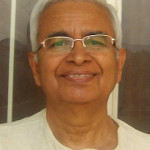 He has taught in Pune University and retired in 2006 as Director of the Centre of Advanced Study in Sanskrit (1979-2006). Prof. Jha has been the founder Chairperson, Special Centre for Sanskrit Studies, Jawaharlal Nehru University, New Delhi (2002-03). He has Authored and edited over 50 books (Language, Philosophy, Logic and Epistemology; Language , Grammar and Linguistics in Indian Traditions; etc.) and published over 150 research articles in Indian and international journals. He has been honoured by a number of academic institutions; Mahamahopadhyaya; Vachaspati; Pandita-sarvabhauma; D.Litt. etc. Prof. Jha has been a visiting professor in Humboldt University, Germany; Nagoya University, Japan; University of Lausanne, Switzerland; and Mahatma Gandhi Institute, Mauritius; (during 1981 and 2005).
He has taught in Pune University and retired in 2006 as Director of the Centre of Advanced Study in Sanskrit (1979-2006). Prof. Jha has been the founder Chairperson, Special Centre for Sanskrit Studies, Jawaharlal Nehru University, New Delhi (2002-03). He has Authored and edited over 50 books (Language, Philosophy, Logic and Epistemology; Language , Grammar and Linguistics in Indian Traditions; etc.) and published over 150 research articles in Indian and international journals. He has been honoured by a number of academic institutions; Mahamahopadhyaya; Vachaspati; Pandita-sarvabhauma; D.Litt. etc. Prof. Jha has been a visiting professor in Humboldt University, Germany; Nagoya University, Japan; University of Lausanne, Switzerland; and Mahatma Gandhi Institute, Mauritius; (during 1981 and 2005).
Born in 1946 at Raiganj (northern part of West Bengal); Educated at Raiganj (Graduation from North Bengal University); Banaras Hindu University (M.A. in Sanskrit with Vedic group); Calcutta University (M.A. in Comparative Philology); Pune University (Ph.D); Received special training in traditional Sanskrit learning at Raiganj and Pune from Pandita Sitakanta Acharya, Srinivasa Sastri and Sivaramakrishna Sastri in Grammar, Indian philosophy, Indian Logic and Indian Hermeneutics.
Abstract of the talk
India has inherited a very long and rich tradition of philosophical discourse. It is a highly reflective tradition and here, nothing is taken for granted without critical reflection. That is why there are nine systems of Indian Philosophy.
In order to facilitate meaningful dialogue and discourse to arrive at the Truth, various tools were developed. A universal model of philosophical inquiry was developed to allow dialogue among participants of divergent worldviews. A framework of argumentation was developed to help the participants either to accept or reject others’ viewpoints. This led to the development of Logic and Epistemology in classical India.
When it was realized that dialogues are not successful every time, they reflected on the cause of such failure and came out with a solution of developing an artificial language for precise communication, called Navya Nyaya language, which may be compared with the development of symbolic or mathematical language in the West. All this could happen because the philosophers realized that natural language is the greatest tool available to human beings to encode a thought and communicate it to others. Some of the philosophers even modeled the whole universe through natural language. Finally, they came out with a universal model of communication. Given an exposure, anyone of any background and of any knowledge system can derive insights for use of these tools even today since they have been used profitably centuries after centuries in various knowledge domains.
Readings